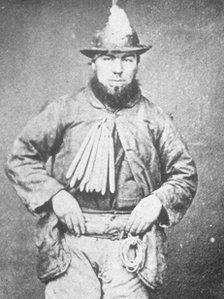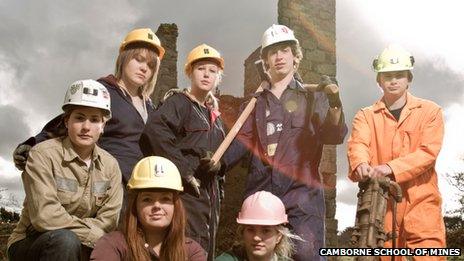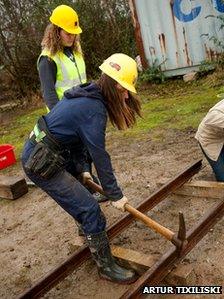Camborne School of Mines hosts International Mining Games
- Published

Many Cornish miners took their skills and knowledge abroad
More than 200 mining students from across the world will be panning for "gold" in Cornwall at the weekend.
Teams from Australia, Canada, the United States, Germany, the Netherlands and Indonesia are in the county for the 34th International Mining Games.
The aim of the competition is to keep old-fashioned mining techniques alive - many of which were developed in Cornwall in the 18th and 19th Century.
Camborne School of Mines (CSM) is hosting the event at King Edward Mine.
Despite its mining heritage, it will be the first time Cornwall has hosted the competition.
The mine - originally part of the Condurrow Mine, near Camborne - was taken over by the School of Mines in 1897 to teach Cornish miners their skills, but it has been run as a heritage museum since 1987 and is now owned by Cornwall Council.
'Nowhere more appropriate'
CSM said organising a mining competition in an area which has been without an operating mine for 15 years was a "challenge", but it was looking forward to it.
The Cornish mining school is part of the University of Exeter and is one of the most famous in the world.
It was founded in 1888 and many of its students took their knowledge and skills across the world.
Cornwall attracted some of the country's best engineers, but it was Cornishman Richard Trevithick who developed high-pressure steam engines to drain water from the deep mines.
In Cornwall's mining past, drownings, rockfalls and explosions were not uncommon and were responsible for countless deaths.

Camborne's students are "confident" of keeping the medals in Cornwall
Tony Brooks, King Edward Mine's director - himself is a mining engineer and former CSM student - said there was "nowhere more appropriate" for the games to be held.
"This will be good for CSM, Camborne and Cornwall," he added.
The competition was started in 1978 in honour of 91 miners who died in the US when a fire broke out at the Sunshine silver mine in Idaho - and also to remember all miners that have died in the line of duty.
Julian German, chairman of the Cornish Mining World Heritage Site, said the international aspect of the games was of special interest because of the impact Cornish mining has had around the world.

Teams will set up and tear down a wagon tracks using sleeper and rails
"There are over six million people of Cornish descent worldwide - in no small part due to the migration of Cornish miners across the world to find their fortune back in the 1800s," he said.
The games are classed as "extremely competitive" and men, women and mixed teams will compete in seven events, which include panning for gold, cutting through timber with a traditional bow saw and drilling into concrete with a hammer and chisel.
With 36 teams of six taking part, organisers said they believed the Cornish games could be one of the biggest in the event's history.
Oakley Turner - one of Camborne's student competitors - said despite the competition they will face, the Cornish teams are confident of victory.
"We've been training hard and are confident that we can keep the medals here in Cornwall," he said.
"It will be a great couple of days and we hope to see strong vocal support from our fellow Cornishmen and ladies."
The international teams will start arriving in the UK over the next two days and a "practice" day will be held at King Edward Mine on Friday, ahead of the two-day competition on Saturday and Sunday, which is open to the public.